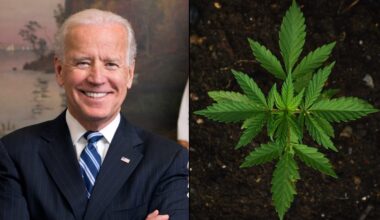Banking associations representing all 50 states and one U.S. territory sent a letter to Senate leaders on Thursday, imploring them to include marijuana banking reform in a large-scale manufacturing bill that’s heading to bicameral conference.
The American Bankers Association (ABA) and the state associations said that the Secure and Fair Enforcement (SAFE) Banking Act is an “urgently needed, and widely supported, bipartisan legislative solution to allow banks to handle the proceeds from state-licensed cannabis businesses and the accountants, skilled trades, landlords, law firms, and other service providers they rely upon for legal operations.”
New – ABA + 51 state bankers associations ask @SenateDems @SenateGOP @SenateBanking @BankingGOP leaders to include “widely supported, bipartisan” #SAFEBanking Act in COMPETES Act so cannabis businesses can access banking in states where cannabis is legal: https://t.co/R3QulFVn8L
— American Bankers Association (@ABABankers) April 28, 2022
The House included the reform in its version of the America COMPETES Act, marking the sixth time that the chamber has advanced the legislation, but the provision was stripped in the Senate.
Now advocates and stakeholders are stepping up their push to get the language attached to the final package, and key lawmakers in both chambers have signaled that they would be working to achieve that.
The banking groups wrote that the current lack of banking access for cannabis businesses means that the “industry is operating primarily in cash, which causes significant public safety concerns and undermines the ability of cannabis regulators, tax collectors, law enforcement and national security organizations to monitor the industry effectively.”
“The SAFE Banking Act is a narrowly tailored solution designed to bring this growing industry into the regulated banking system and provide much-needed visibility into its financial activity,” the letter says, adding that the measure would promote transparency and improve tax collection.
“The inability of the state-licensed cannabis industry to access safe and regulated financial services is a pressing concern for so many of our nation’s communities and the banks that serve them. With state-licensed cannabis businesses currently operating in 37 states and more states weighing legalization, we urge you to include the SAFE Banking Act in the compromise version of the COMPETES Act to address these critical issues as quickly as possible.”
Rep. Earl Blumenauer (D-OR), a longstanding champion for cannabis reform who was appointed to serve as a conferee on the America COMPETES Act, sent a separate letter on the issue to House and Senate leadership this week alongside alongside SAFE Banking sponsor Rep. Ed Perlmutter (D-CO).
At a recent event hosted by ABA, Perlmutter said that he will “continue to be a real pest, and persistent in getting this done” before he leaves Congress.
Ahead of that event, the financial group released a poll that it commissioned showing that a strong majority of Americans support freeing up banks to work with marijuana businesses without facing federal penalties.
Meanwhile, some are holding out hope that conferees will work to get the banking reform proposal back into the America COMPETES Act.
Sen. Patty Murray (D-WA), a conferee and the third-highest-ranking Senate Democrat, recently visited a credit union for an event where she reiterated her support for passing the bipartisan cannabis banking reform bill and explained how she’ll fight to get the policy change enacted sooner rather than later.
House Financial Services Committee Chairwoman Maxine Waters (D-CA), another conferee, also listed the SAFE Banking Act as a legislative priority as negotiations are set to begin.
Part of the urgency behind advancing this reform is a recent surge in crime targeting cash-intensive marijuana businesses in legal states.
With burglaries and robberies on the rise at licensed cannabis retailers, Washington Gov. Jay Inslee (D) and other officials have convened a meeting with marijuana stakeholders and financial institutions to “discuss cash-less options for store operations,” the state Liquor and Cannabis Board (LCB) said in a notice last week.
Inslee, State Treasurer Mike Pellicciotti and others will separately be sending a letter to Congress to reiterate their call for a federal fix to the state-federal policy conflict on cannabis banking issues, LCB said.
Washington State officials also recently held a virtual roundtable to address the spate of deadly robberies targeting marijuana retailers, with regulators reiterating their call for a federal policy change and discussing steps the state can take on its own while Congress fails to act.
The reluctance from the Senate to pass the SAFE Banking Act prior to enacting comprehensive legalization was also the subject of a letter from Perlmutter that was sent to Senate leadership last week.
Adding pressure to pass the marijuana banking bill as part of America COMPETES is the fact that Senate Majority Leader Chuck Schumer (D-NY) recently said that the timeline for the introduction of his legalization bill has been pushed back, despite saying previously that it would be formally filed this month.
As Congress continues to stall on marijuana banking reform, more state officials and lawmakers are taking steps on their own to resolve the issue, especially in light of the targeted crime surge.
Pellicciotti, Washington State’s treasurer, has also been especially vocal about the need for congressional reform, and he wrote in a recent letter to his colleagues in other states that it’s “just not safe to have this financial volume in cash.”
He made similar remarks at a recent conference of the National Association of State Treasurers (NAST). And Colorado Treasurer Dave Young echoed that sentiment in a recent interview with Marijuana Moment.
The Pennsylvania Senate separately approved a bill this month to safeguard banks and insurers against being penalized by state regulators for working with state-legal medical marijuana businesses.
Perlmutter, for his part, has even made a point to talk about enacting the reform legislation during committee hearings on ostensibly unrelated or wider-ranging legislation, like at a recent House Rules Committee hearing.
Despite recently saying that he’s “confident” that the Senate will take up his bill this session, the congressman recognized that while he’s supportive of revisions related to criminal justice reform, taxation, research and other issues, he knows that “as we expand this thing, then we start losing votes, particularly Republican votes and we got enough votes in the Senate to do it” as is.
Meanwhile, the number of banks that report working with marijuana businesses ticked up again near the end of 2021, according to recently released federal data.
It’s not clear if the increase is related to congressional moves to pass a bipartisan cannabis banking reform bill, but the figures from the Financial Crimes Enforcement Network (FinCEN) signal that financial institutions continue to feel more comfortable servicing businesses in state-legal markets.
Some Republicans are scratching their heads about how Democrats have so far failed to pass the modest banking reform with majorities in both chambers and control of the White House, too. For example, Rep. Rand Paul (R-KY) criticized his Democratic colleagues over the issue in December.
Medical Disclaimer:
The information provided in these blog posts is intended for general informational and educational purposes only. It is not a substitute for professional medical advice, diagnosis, or treatment. Always seek the advice of your physician or other qualified healthcare provider with any questions you may have regarding a medical condition. The use of any information provided in these blog posts is solely at your own risk. The authors and the website do not recommend or endorse any specific products, treatments, or procedures mentioned. Reliance on any information in these blog posts is solely at your own discretion.







